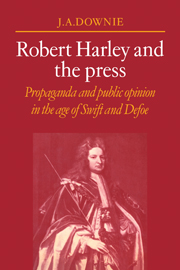Book contents
- Frontmatter
- Contents
- Preface and Acknowledgements
- Author's note
- Introduction
- Part one 1689–1708
- 1 The propaganda of court and country
- 2 The paper war of 1701
- 3 Harley and Defoe
- 4 The Memorial of the Church of England (1705): a case study
- Part two 1708–1714
- Epilogue: impeachment and after
- Abbreviations
- Notes
- Index
4 - The Memorial of the Church of England (1705): a case study
Published online by Cambridge University Press: 07 October 2011
- Frontmatter
- Contents
- Preface and Acknowledgements
- Author's note
- Introduction
- Part one 1689–1708
- 1 The propaganda of court and country
- 2 The paper war of 1701
- 3 Harley and Defoe
- 4 The Memorial of the Church of England (1705): a case study
- Part two 1708–1714
- Epilogue: impeachment and after
- Abbreviations
- Notes
- Index
Summary
If the employment of a ministerial propagandist on a more or less permanent footing, the establishment of an unofficial government press organ, and of a system for disseminating propaganda, were the most tangible and enduring achievements of Harley's press policy as secretary of state, his involvement with Defoe was, nonetheless, not his sole concern during these years. The events surrounding the appearance of The Memorial of the Church of England provide a case study of Harley in action during his time in office. In the wake of the 1705 election campaign, chiefly managed by Harley for the government, the publication of this pamphlet – a full-blown High Church attack on the Godolphin administration and its policy of ‘moderation’ – caused an outcry. Queen Anne was bitterly upset at accusations that she was not acting in the true interests of the Church of England. Godolphin was close to tears.
In the succeeding months Harley pursued an active policy of proscription, not only in attempting to trace the author or authors of the offending tract, but also investigating the genesis of a number of other publications from both whigs and tories that tried to cash in on the controversy precipitated by the Memorial. As secretary, Harley was officially responsible for the prevention and suppression of outspoken criticism of the ministry, and for the prosecution of offenders if and when apprehended. From May 1705 onwards, well into 1706, he vigorously carried out these duties.
- Type
- Chapter
- Information
- Robert Harley and the PressPropaganda and Public Opinion in the Age of Swift and Defoe, pp. 80 - 100Publisher: Cambridge University PressPrint publication year: 1979
- 1
- Cited by



